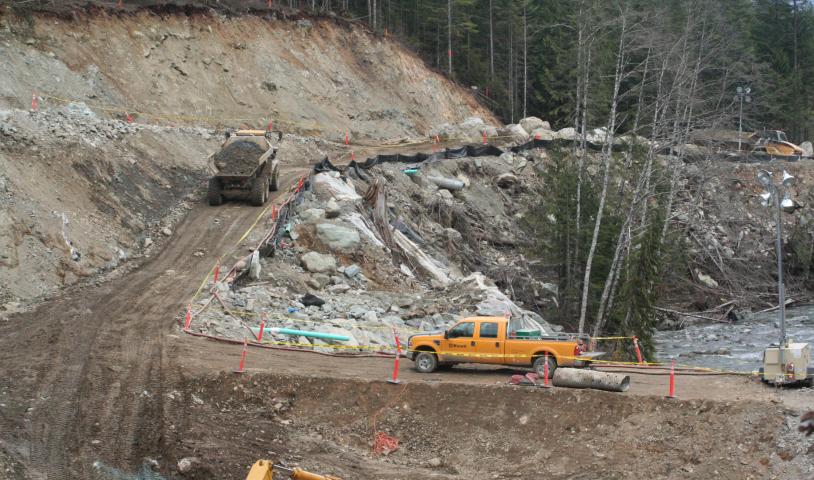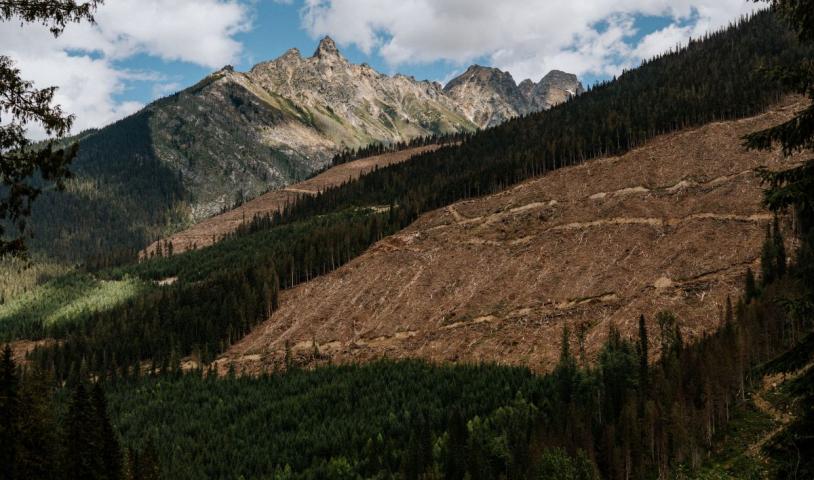Run‑of‑river project blasted
Wednesday, June 17, 2009
Documents prove massive abuse, say environmentalists
Environmentalists' worst fears about run-of-river projects have come true with the discovery that officials have lodged numerous complaints against the Upper Harrison Lake project, a conservation group said yesterday.
The B.C. Ministry of Environment complaints include building a bridge illegally, destroying red-legged frogs' habitat, building shoddy roads that caused numerous mudslides, logging in old-growth forests and damaging fish-bearing rivers.
Documents prove massive abuse, say environmentalists
Environmentalists' worst fears about run-of-river projects have come true with the discovery that officials have lodged numerous complaints against the Upper Harrison Lake project, a conservation group said yesterday.
The B.C. Ministry of Environment complaints include building a bridge illegally, destroying red-legged frogs' habitat, building shoddy roads that caused numerous mudslides, logging in old-growth forests and damaging fish-bearing rivers.
The disclosures come from 1,800 pages of documents released as a result of a freedom-of-information request from the Wilderness Committee.
"The proof's in the pudding. The province is playing Russian roulette with 600 B.C. rivers staked out for private power projects," the Wilderness Committee's Gwen Barlee said yesterday. "Environmental enforcement is lax and these documents show that's the case."
She does not expect any charges to be laid in any of the complaints.
The $300-million, 150-megawatt project involves five run-of-river generating sites. When completed next year, Cloudworks Energy expects to provide enough electricity to power 60,000 homes annually.
In the documents, ministry staff openly deride the environmental practices of Cloudworks' contractor, Kiewit Corp., a Fortune 500 company and one of the world's largest contractors.
Maple Ridge conservation officer Peter Busink wrote about the company's "disturbing" practices in a memo on March 30, 2008.
"Even more disturbing is the corporate mindset that either knowingly completed illegal works or was not aware that agency approvals were required," wrote Busink.
Fish-protection hydrologist Scott Babakaiff said ministry staff "really must organize a Kiewit road-construction-induced landslide pool."
"[We could] throw in a few dollars, pick a date, and see who wins. It'll be more fun than a meat draw, and recent history suggests there will be no shortage of action," wrote Babakaiff on March 26, 2008.
A third memo discusses the company's "illegal bridge" at Douglas Creek.
According to Busink, Cloudworks environmental manager Cory Bettles allegedly told Busink "it was likely Kiewit thought it might be worth the risk to construct the bridge without approvals."
Bettles believed "paying a fine" was Kiewit's "cost of doing business," wrote Busink on March 30, 2008.
Bettles said through the company that he does not agree with Busink's recollection of his comments. Bettles said relevant permits for bridge construction existed from fisheries officials. Cloudworks principal owner Nick Andrews said the company welcomes environmental oversight.
"We're not making a mess. We're adhering to the stringest environmental standards. In total, there have been very few instances of environmental harm done," he said. "One thousand, eight hundred pages of documents shows we're being monitored."
He said the e-mails appeared "to reflect viewpoints of individual ministry staff . . . They are in some cases based on erroneous or incomplete understandings of circumstances, and do not accurately reflect final outcomes."
Andrews admitted the company missed a "notification requirement" on the Douglas bridge construction.
The company was also issued a $175 ticket for straying outside a licence-to-cut boundary, involving about 10 cubic metres of timber.
Environment Minister Barry Penner said the documents are proof that his ministry is investigating projects under construction.
"I have asked my staff to make sure that every project that is under construction is being watched and gets their attention," he said.
"There are conservation officers that came through there -- there is a government presence in that valley."
But New Democratic Party environment critic Rob Fleming said the documents show that not enough ministry staff are available to make sure the power producers follow regulations.
"The Ministry of the Environment has been cut so badly that there is no compliance or effective monitoring," said Fleming.
kspencer@theprovince.com
--
What are IPPs, run-of-river?
IPPs are private power companies that compete to sell energy to B.C. Hydro. Of 48 IPPs currently operating in the province, most are run-of-river.
Rather than using giant river dam/reservoirs traditionally used for power generation, run-of-river technology diverts water, channelling it through pipes. Rushing water shoots through energy-capture turbines before re-entering the river.
© Copyright (c) The Province





